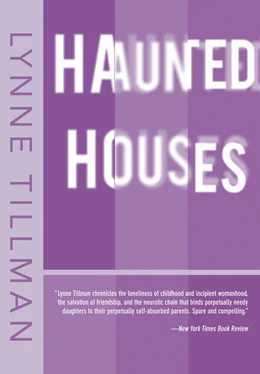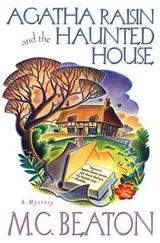Lynne Tillman - Haunted Houses
Здесь есть возможность читать онлайн «Lynne Tillman - Haunted Houses» весь текст электронной книги совершенно бесплатно (целиком полную версию без сокращений). В некоторых случаях можно слушать аудио, скачать через торрент в формате fb2 и присутствует краткое содержание. Год выпуска: 2011, Издательство: Red Lemonade, Жанр: Современная проза, на английском языке. Описание произведения, (предисловие) а так же отзывы посетителей доступны на портале библиотеки ЛибКат.
- Название:Haunted Houses
- Автор:
- Издательство:Red Lemonade
- Жанр:
- Год:2011
- ISBN:нет данных
- Рейтинг книги:5 / 5. Голосов: 1
-
Избранное:Добавить в избранное
- Отзывы:
-
Ваша оценка:
- 100
- 1
- 2
- 3
- 4
- 5
Haunted Houses: краткое содержание, описание и аннотация
Предлагаем к чтению аннотацию, описание, краткое содержание или предисловие (зависит от того, что написал сам автор книги «Haunted Houses»). Если вы не нашли необходимую информацию о книге — напишите в комментариях, мы постараемся отыскать её.
, Tillman wries of the past within the present, and of the inescapability of private memory and public history. A caustic account of how America makes and unmakes a young woman.
Haunted Houses — читать онлайн бесплатно полную книгу (весь текст) целиком
Ниже представлен текст книги, разбитый по страницам. Система сохранения места последней прочитанной страницы, позволяет с удобством читать онлайн бесплатно книгу «Haunted Houses», без необходимости каждый раз заново искать на чём Вы остановились. Поставьте закладку, и сможете в любой момент перейти на страницу, на которой закончили чтение.
Интервал:
Закладка:
Papa used to say with pride: Simone has a man’s brain; she thinks like a man; she is a man. And yet everyone treated me like a girl.
When Emily returned to making notes for her paper, it was a relief. The Puritans were in Vietnam, another holy mission, all for their, the other’s, good. Of course it had to do with money — capital, she wrote, hearing the word in syllables — but in the heartland, they’re not thinking about money, they’re thinking about God and doing right, evil Commies. She’d have to clean up this paper and put it in the right language. If I ever graduate, she thought, it’s because I’ll have agreed to this language. She still couldn’t tell if she was learning anything. That’s why it took her forever to finish one of these papers. That should be obvious, she thought. It surprised her why things were obvious to her and not to someone else. Christine and she were not really surprised by each other’s connections. But she couldn’t bring herself to tell Christine about her dreams. Emily had read that in England people who had seen the Loch Ness monster called themselves experienced monster-watchers. You can’t restrain your monsters ail the time, they slip out, awkward, angry, and ugly, to embarrass and humiliate. Emily got humiliated as fast as she got red under a hot sun. She turned pale when she’d made a mistake, let something slip, and felt really dead from embarrassment. Those little deaths — the one she hadn’t experienced in sex — she had experienced through mistakes, errors, flaws. She tried to observe herself, to contain that which might reveal too much. She could see a kind of parallel between her containment policy and those global efforts on the part of her government, but to bring that into her paper would be another line of thought again.
Keith phoned just as she wrote, Fame and paranoia are transformations, convoluted forms of salvation and sainthood. I think I can prove that, she muttered as she picked up the receiver. Their record was selling, but he didn’t have any money. Puritans wanted to conform and have the world conform to their idea of what God would want. Keith kept talking and she kept writing, pausing only to say that she’d have dinner with him and could lend him some money, if he’d pay her back soon. Perhaps if she wore a long red dress. She hated that thought almost as much as Christine hated feeling undressed no matter what she wore. Not exactly undressed, but raw. Like an uncooked egg. Christine’s soft-boiled egg had been much too runny, and she ate it with annoyance. When she was a child her mother would put pieces of bread into a soft egg, so that the yellow was almost soaked up and she could eat it. Christine couldn’t bring herself to do it, baby herself that way. Life without mother had to be categorically different from life with mother. She had just spoken with her mother, who had again asked for a raise and then in anger put her eyeglasses on upside down. They laughed about it, her mother’s ineptitude, and it would be a good story to repeat to Emily. Emily, she thought, would love it.
Part V
Chapter 13
What shall Cordelia speak? Love and be silent.
Cordelia loved King Lear as much as Jane loved her father, but Cordelia was a better daughter. He kicked her out and she came to his rescue. Jane didn’t think she wanted to rescue her father, even if she could. Jane had two older sisters, also. One said to her, I like you better when you’re fat. You’re nicer. Jane didn’t think of herself as nice, and began to refer to herself as she when making entries in her diary. Jimmy told her that when she died he’d publish them and everyone would cry because she was dead. Jane didn’t want them published. The thought of it made her sick.
She is a player in his world. It is good and evil, and he tells her she’s evil. He also tells her he loves her. She’s four years old and she’s hiding in the bathroom. She made him angry. She did something to make Frank angry. Jane scratched that out. She didn’t want Frank in her diary anymore. She didn’t have to see him because she was back in college. She felt lucky to have met Maria, someone to talk to. Jane went to the phone and dialed her number, but it was busy. She arouses the devil in him. She arouses in him the devil. Lois would’ve liked being in college, she would’ve gotten something out of it. She is passing time or is suspended in it. In the front of Jane’s very first diary was a picture of her dead friend, taken when they were ten, at a party when they barely knew each other. Lois is grinning, no idea of death, nothing like this shows no matter how long one stares. Maurice had once quoted Duchamp: “After all it is always the other person who dies.” Jane forgot who wrote it, but her imperfect memory had recorded that this appeared on somebody’s tombstone. Maurice told Jimmy he was sick of her imperfections.
Jane wasn’t perfect, as Felix predicted she might be. Even with sex. Though now that she wasn’t innocent of it and not considered innocent, life was different. It was as if a door had been opened and once it was open, it couldn’t be shut. You know that old worry that they can tell you’re not a virgin, that it shows. It does. But not on your face. It’s in your body, out of your body, and it’s in your mind. She had been entered.
Jane fell in love with a guy who lived with someone else and told her they were breaking up. He moves toward her and she feels something never felt before. A shudder. He’s tall and sandy-haired. They’re introduced while watching a fire on St. Mark’s Place. It’s a wonderful way to meet, they agree. They walk away, toward the west. She takes two steps to his one. They sit opposite each other in an old diner with booths and a great jukebox. She’s never felt this way before and she thinks it’s the real thing. She decides not to sleep with him until some time passes. Then it’ll be right, it’ll mean more. It’s a kind of empty terrain she feels herself in: pale eyes, long legs, the shudder, the sense of being looked at nourishing her. This shifts into her being swallowed, taken in through the eye and the mouth, devoured without being touched. She swallows longing.
We have this hour a constant will to publish our daughter’s several dowers, so that future strife may be prevented now.
Uncle Larry wanted to see Jane. Business was so bad he and her father were trying to sell, if they could find a buyer. Both men had wanted to leave the business to their children, all girls. The eldest sister wondered what would have happened had there been a boy. But as it was, all girls and nothing to inherit. Larry and Jane were walking in Central Park, heading for the cafeteria and frankfurters and milk, to feed Larry’s ulcer. He was talking about how it was in the office, with no customers. Just bolts of material around, neatly stacked and colorful. The salesmen had been let go, then one died of a heart attack. She pictured her father, bent over a piece of fabric, the magnifying glass to his eye. “We just walk around the office or look at each other. Sometimes that Filipino comes in with his pretty wife, but we don’t have anything to sell him. He’s polite and leaves and your father gets humiliated and I try to cheer him up. He takes everything so hard.” The monkeys jumped, the gorilla stared, and the orangutan and her child sat in a corner, picking bugs from each other. “You always forget,” Larry said, “how ugly zoos are until you see them again. Kids see animals on television, they don’t need to see real ones.” The seals were being fed. They were leaping out of the water, grabbing a fish from the keeper’s hand, diving back down again, all one continuous movement, clean and deliberate. Larry thought that the seals looked all right. Small children squealed each time a seal rose out of the water, a miracle. A child was crying and Jane watched her. Her mother had walked away, leaving her with another child who was slightly older. As soon as the mother’s hand had left hers, the child screamed. Her face got red and her eyes rolled around. She screamed and screamed and screamed. Jane watched. She was angry at the child for screaming. It had done something wrong. It was being too demanding. It deserved it. Why couldn’t she leave her mother alone? Jane wondered if you could scream and breathe at the same time. Watching, she felt suspended in it. It was like being at and in the movies simultaneously. “We haven’t looked at the home movies lately,” she said to Larry when the mother came back to the child. Larry asked her if she was remembering the first time they took her here. “Sort of,” Jane answered.
Читать дальшеИнтервал:
Закладка:
Похожие книги на «Haunted Houses»
Представляем Вашему вниманию похожие книги на «Haunted Houses» списком для выбора. Мы отобрали схожую по названию и смыслу литературу в надежде предоставить читателям больше вариантов отыскать новые, интересные, ещё непрочитанные произведения.
Обсуждение, отзывы о книге «Haunted Houses» и просто собственные мнения читателей. Оставьте ваши комментарии, напишите, что Вы думаете о произведении, его смысле или главных героях. Укажите что конкретно понравилось, а что нет, и почему Вы так считаете.












